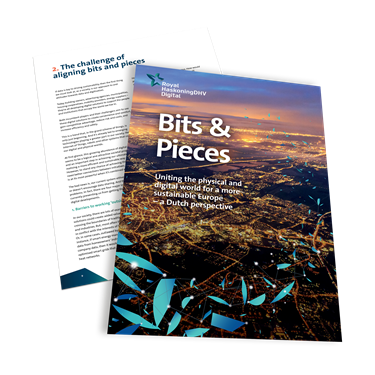Barriers to digital collaboration

In this blog, we’ll examine some of the challenges that can stand in the way of the scalability and a free data sharing required to tackle these issues – and explore the Watercloud initiative, as a recent study that shows the true potential of a collaborative approach to technology.
Key take-aways
Learning to work together
When groups share their digital technologies, insights and breakthroughs, sustainability initiatives can thrive. Data pools get more extensive and more accurate. IoT sensors and other data sources can feed into multiple projects. Different technologies can integrate into a shared infrastructure for interoperability.But this isn’t the way most industries and groups are used to working – and that means there are several barriers to overcome to make this collaborative future a reality.
1. Cultural and organisational
In industries and disciplines built on intellectual property and with the constant need to be first to market, collaboration doesn’t always come naturally.
For many groups, there will be concerns about the risks of sharing information with potential competitors – particularly in sustainability efforts, which often include major innovations and novel technologies.
Overcoming this hurdle will be difficult. Building up trust will take time, but setting mutually agreed ground rules for how intellectual property is managed, while enabling data sharing for the public good, will go a long way to creating the foundation for a collaborative future.
2. Legal and regulatory
Restrictions on data sharing and storage have tightened in recent years, which can make collaboration across territories more difficult. Some types of information can only be stored under specific conditions – with anonymisation or encryption, for example – while others can’t be moved beyond borders.
Intelligent data management must be at the core of any collaboration effort, and this is a situation where governmental oversight can be particularly useful. With legislators involved in digital projects, all parties can ensure that they are working safely within the boundaries of sovereignty, privacy and storage requirements.
3. Technical and operational
Every organisation approaches its projects a little differently. And that can make it difficult to bring initiatives together neatly.
Often, there’s a lack of interoperability between different datasets and technologies, which can introduce extra tasks for adapting the models organisations use, or updating technical infrastructures. That work – and the costs associated with it – can be off-putting for some groups.
But if we want to move to larger ecosystems with exchangeable data sources to manage the bigger societal challenge, we will require overarching standards for how data should be collected and stored, which basic technologies to use, and how groups should communicate.
This will help set projects up for long-term collaborative success.
Collaboration in action
Let’s look at an example of how this process works in practice.In May 2020, a nationwide consortium of leaders in the water sector published the Watercloud Vision study, a consultation led by Royal HaskoningDHV on behalf of the National Water Authority (Rijkswaterstaat).
The study involved hydrologists, cloud technology experts, data modellers and more from almost 50 water managing organisations and their service providers.
It assessed how the industry could apply state-of-the-art cloud technology to build a connected ecosystem of data sources, sophisticated hydrological models, and pre- and post-processing tools as a means to effectively meet the major climate change challenges Dutch water management is facing.
The study concluded that a collaborative multi-cloud platform would be the ideal way for the industry to make better informed, more widely applicable decisions about water management policy, with clear, shared principles and stakeholder-driven governance.
With the initial report published, the Dutch water sector is moving forward on making this a reality.
You can find the full Dutch report here.
Fragmentation isn’t sustainable
Overcoming the barriers, we’ve discussed here will provide measurable benefits to individual organisations and collaborative projects alike. But more importantly, we simply can’t tackle the fundamental challenges society faces – such as sustainability – with the degree of fragmentation we have today.The only way to create a truly sustainable tomorrow is to take a collaborative approach to data and digital technologies, where everyone benefits from the power of each other’s insights.
In our national digital twin white paper, industry specialist Jaron Weishut and Ben Lomax Thorpe explore how uniting the physical and digital worlds can help our society build a more sustainable Europe – and why collaboration is a vital component of that vision.
Discover how we can work to resolve the inefficiencies that are holding sustainability initiatives back, with a holistic approach to large-scale digitisation.
National digital twin: bits & pieces white paper

